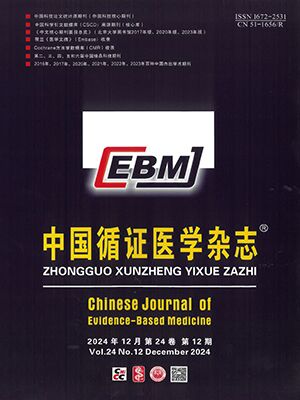| 1. |
Qiu R, Zhao C, Liang T, et al. Core outcome set for clinical trials of COVID-19 based on traditional Chinese and western medicine. Front Pharmacol, 2020, 11: 781.
|
| 2. |
邱瑞瑾. 中医临床研究核心指标集的方法构建. 北京: 北京中医药大学, 2018.
|
| 3. |
Qiu R, Zhong C, Han S, et al. Development of a core outcome set for myocardial infarction in clinical trials of traditional Chinese medicine: a study protocol. BMJ Open, 2019, 9(12): e032256.
|
| 4. |
Qiu R, Li M, Zhang X, et al. Development of a core outcome set (COS) and selecting outcome measurement instruments (OMIs) for non-valvular atrial fibrillation in traditional Chinese medicine clinical trials: study protocol. Trials, 2018, 19(1): 541.
|
| 5. |
王永炎, 张启明, 张志斌. 证候要素及其靶位的提取. 山东中医药大学学报, 2006, 30(1): 6-7.
|
| 6. |
张志斌, 王永炎. 证候名称及分类研究的回顾与假设的提出. 北京中医药大学学报, 2003, 26(2): 1-5.
|
| 7. |
邱瑞瑾, 李敏, 韩松洁, 等. 《COMET手册》1. 0版解读及其对构建中医临床研究核心指标集的启示. 中国循证医学杂志, 2017, 17(12): 1482-1488.
|
| 8. |
楚艳贞. 胺碘酮和贝那普利联合用药治疗阵发性心房颤动的临床疗效和安全性. 中国实用医刊, 2017, 44(13): 18-20.
|
| 9. |
林松. 替米沙坦联合胺碘酮治疗高血压伴阵发性心房颤动患者疗效及对血清BNP, MMP-2及CTGF水平的影响. 中国药师, 2017, 20(6): 1055-1058.
|
| 10. |
祝瑜. 坎地沙坦联合胺碘酮治疗老年高血压合并持续性心房颤动患者的疗效评价. 医疗装备, 2017, 30(10): 17-18.
|
| 11. |
周朝伟. 分析比较静脉推注胺碘酮与西地兰治疗快速阵发性房颤的效果. 中国医药科学, 2017, 7(10): 169-171.
|
| 12. |
段文涛, 史东, 王新夺, 等. 胺碘酮联合螺内酯在持续性心房颤动转复后维持窦性心律中的作用. 中国老年学杂志, 2017, 37(8): 1924-1925.
|
| 13. |
谭强, 李广平, 张双月, 等. 氟伐他汀预防阵发性心房颤动复发疗效观察. 中华实用诊断与治疗杂志, 2017, 31(4): 384-386.
|
| 14. |
苏晴, 程绩, 邓小飞, 等. 胺碘酮治疗老年急性心肌梗死伴心房颤动的临床研究. 现代生物医学进展, 2017, 17(5): 856-858.
|
| 15. |
赵同波, 董晓辉. 阿托伐他汀钙治疗老年慢性心力衰竭合并房颤患者效果观察. 中国处方药, 2017, 15(2): 85-85,86.
|
| 16. |
李翔宇, 黄进, 戴剑. 培哚普利联合阿托伐他汀对高血压合并阵发性房颤患者炎症因子的干预作用. 江苏医药, 2016, 42(24): 2720-2722.
|
| 17. |
于海燕. 胺碘酮联合厄贝沙坦治疗高血压合并阵发性房颤患者的应用效果. 中国民康医学, 2016, 28(24): 27-28.
|
| 18. |
张英强, 印小荣. 不同剂量瑞舒伐他汀对阵发性心房纤颤患者转归的影响. 实用老年医学, 2016, 39(12): 994-996.
|
| 19. |
周辉, 王志敬, 周茂峰, 等. 替米沙坦预防高血压伴阵发性心房颤动的临床研究. 中国基层医药, 2016, 23(24): 3696-3700.
|
| 20. |
蒙涛, 徐海, 林振宇, 等. 胺碘酮联合美托洛尔治疗不稳定型心绞痛伴快速心房颤动的临床疗效. 实用心脑肺血管病杂志, 2016, 24(S1): 34-36.
|
| 21. |
沈柿芬. 胺碘酮联合缬沙坦治疗原发性高血压伴阵发性心房颤动效果观察. 中国乡村医药, 2016, 23(20): 19-21.
|
| 22. |
黄寰, 何晓青, 张慧敏, 等. 瑞舒伐他汀对高血压伴阵发性房颤的作用. 热带医学杂志, 2016, 16(9): 1132-1136.
|
| 23. |
黄金莹, 姚丹林, 李渊. 艾司洛尔与胺碘酮控制快速心房颤动心室率的效果观察. 中外医学研究, 2016, 14(16): 21-22,23.
|
| 24. |
许哲通, 冯志霞, 王茜, 等. 美托洛尔联合螺内酯及美托洛尔联合缬沙坦治疗孤立性阵发性心房颤动的疗效观察. 心脑血管病防治, 2016, 16(1): 48-50.
|
| 25. |
苏长安, 曾赣惠. 达比加群酯与华法林对非瓣膜性房颤患者抗凝有效性及安全性比较分析. 江西医药, 2015, 50(11): 1166-1170.
|
| 26. |
袁帅, 刘福颂. 坎地沙坦酯联合瑞舒伐他汀治疗慢性心力衰竭并阵发性心房纤颤效果. 齐鲁医学杂志, 2015, 30(5): 587-589.
|
| 27. |
李玲, 罗晓丽, 王红勇. 胺碘酮联合达比加群酯治疗非瓣膜性心房颤动的疗效和安全性分析. 检验医学与临床, 2015, (14): 1997-1998.
|
| 28. |
黄建振, 彭俊, 高世龙. 缬沙坦对老年高血压合并持续性心房颤动患者炎症因子及左心房内径的影响. 心脑血管病防治, 2015, (2): 107-109.
|
| 29. |
徐少东, 周炳凤, 付敏敏, 等. 米力农联合去乙酰毛花苷在慢性心力衰竭并发心房颤动患者心功能不全急性加重期的应用. 岭南心血管病杂志, 2015, 21(2): 207-210.
|
| 30. |
冯文静, 张睿, 李林岭, 等. 阿司匹林与脉血康联合华法林治疗老年非瓣膜性房颤伴急性脑梗死的对照研究. 河北医药, 2015, 37(5): 663-665.
|
| 31. |
郭寿贵, 郭佳茹, 许惠莲, 等. 阿托伐他汀对冠心病并慢性心力衰竭及心房纤颤患者的预后研究. 海南医学, 2015, 26(4): 486-489.
|
| 32. |
康登伟. 冠心病合并心房颤动的抗血栓治疗研究. 甘肃医药, 2015, 34(2): 115-118.
|
| 33. |
王天锡. 桃仁红花煎联合华法林治疗非瓣膜性心房颤动血瘀证的疗效观察. 中西医结合心血管病电子杂志, 2015, (3): 30-32.
|
| 34. |
戴萌李滨王忠明董秋立杨雪佳. 抗栓治疗在低危和中危非瓣膜性房颤中的疗效分析. 临床和实验医学杂志, 2015, (2): 111-114.
|
| 35. |
狄勇, 王志敬, 查吴浩, 等. 替米沙坦对高血压伴心功能不全患者阵发性心房颤动复发的影响. 临床内科杂志, 2017, 34(5): 316-319.
|
| 36. |
潘贤明, 刘松. 坎地沙坦与瑞舒伐他汀对房颤患者左房结构的影响. 母婴世界, 2016, (9): 11-12.
|
| 37. |
邱瑞瑾, 张晓雨, 李敏, 等. 中医证候命名规范化研究在核心指标集构建中的意义及方法. 中华中医药杂志, 2018, 33(6): 2240-2243.
|
| 38. |
Williamson PR, Altman DG, Bagley H, et al. The COMET Handbook: version 1.0. Trials, 2017, 18(Suppl 3): 280.
|
| 39. |
邱瑞瑾, 胡嘉元, 李敏, 等. 核心指标集研究方案的标准报告条目解读及不同核心指标集研究报告指南对中医药领域研究的意. 中国循证医学杂志, 2019, 19(12): 1492-1497.
|
| 40. |
Kirkham JJ, Gorst S, Altman DG, et al. Core Outcome Set-STAndards for Reporting: The COS-STAR Statement. PLoS Med, 2016, 13(10): e1002148.
|




